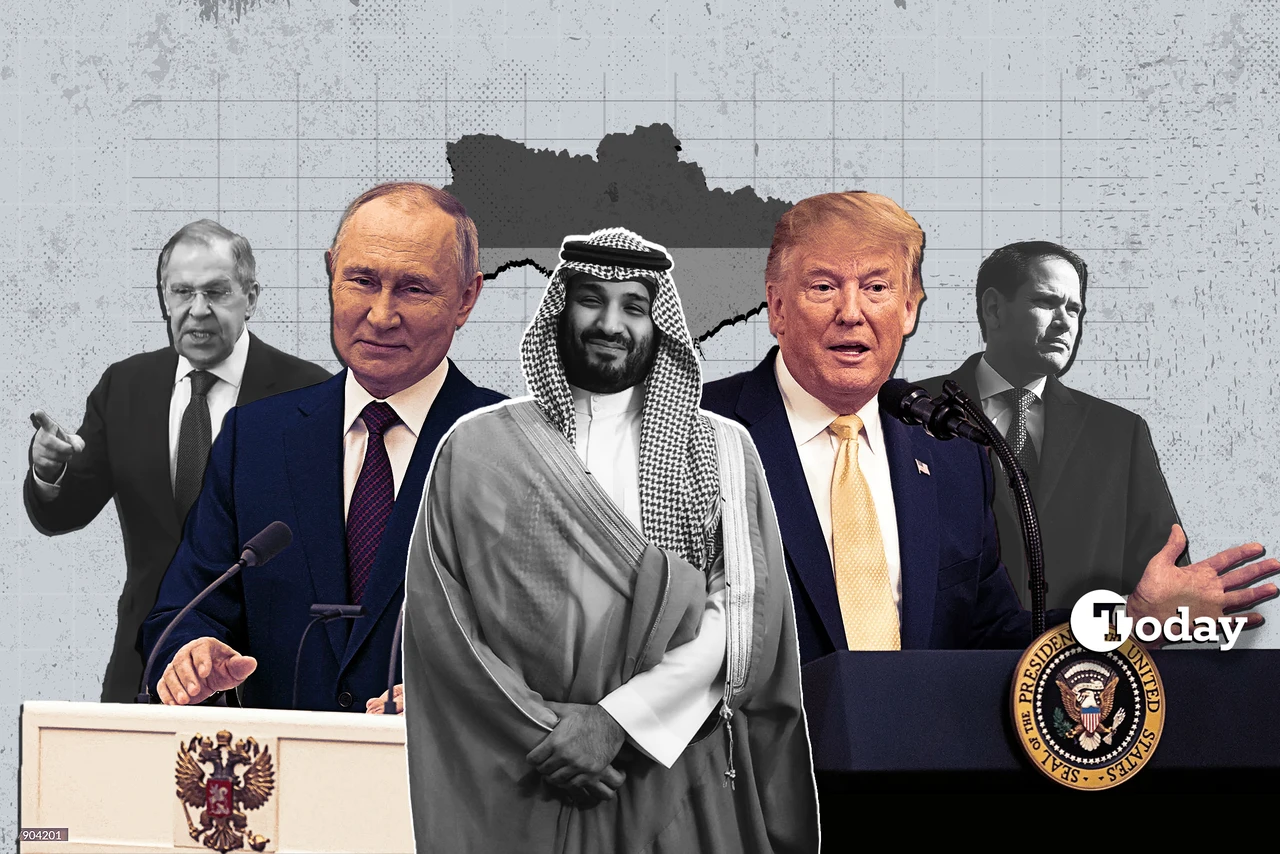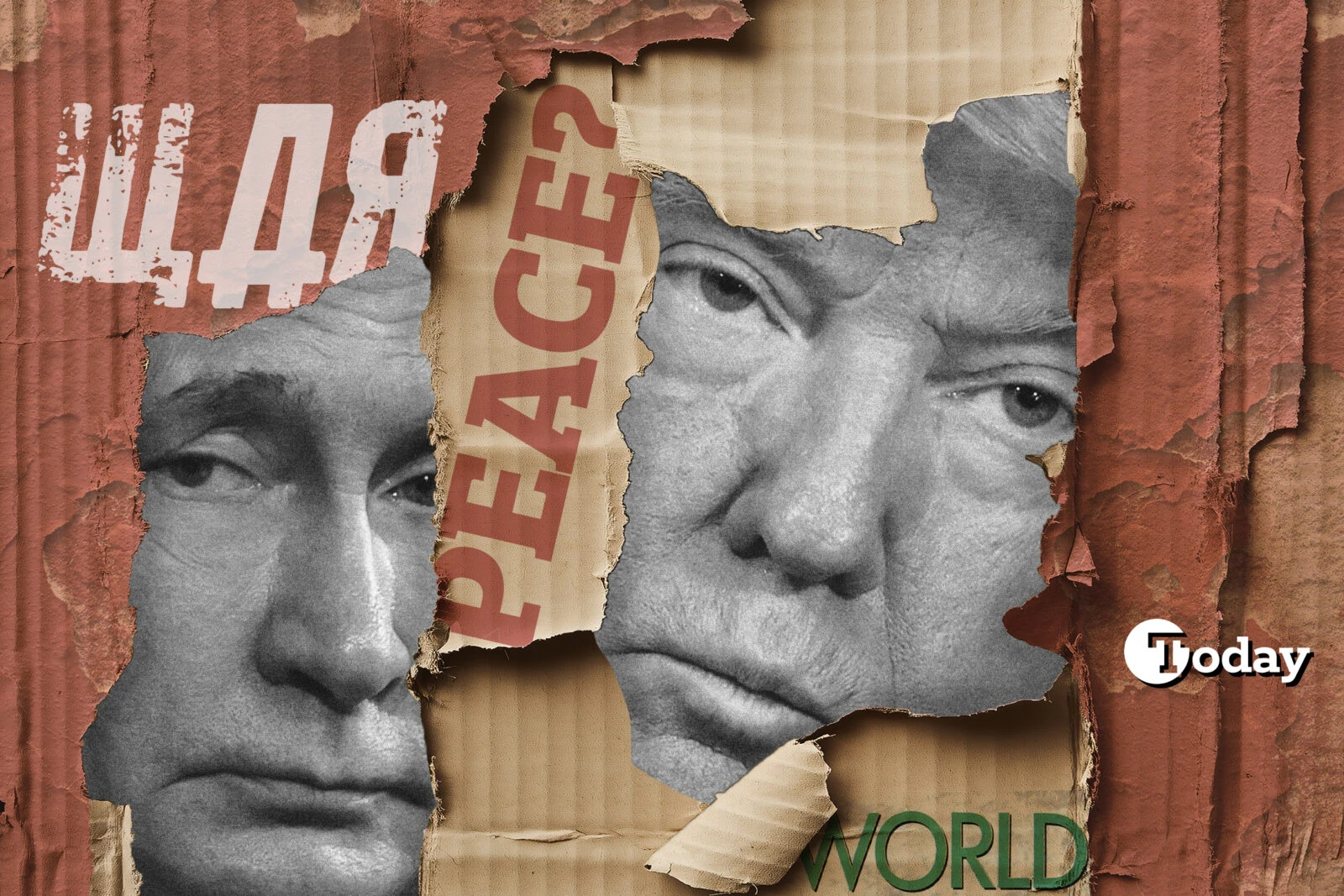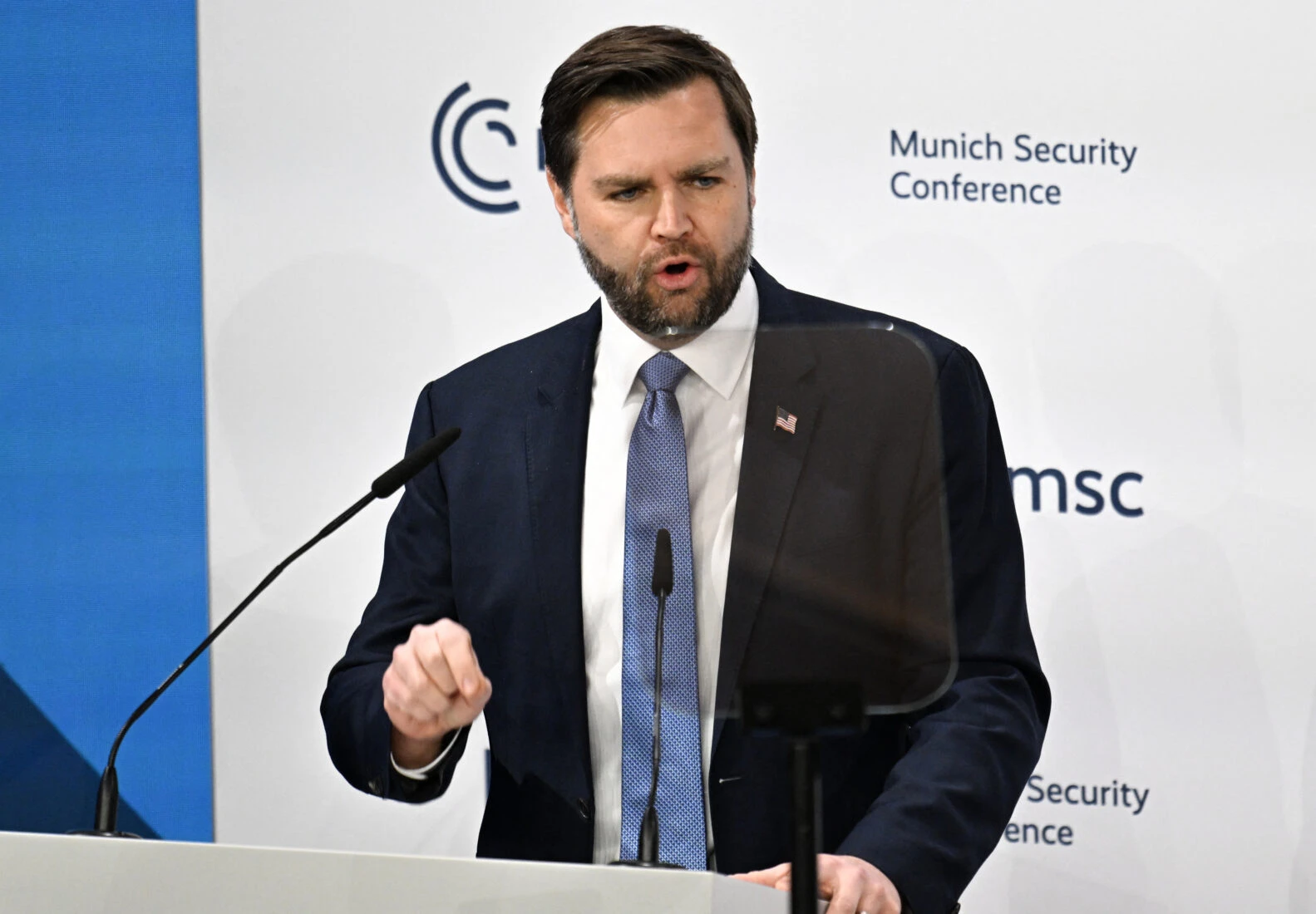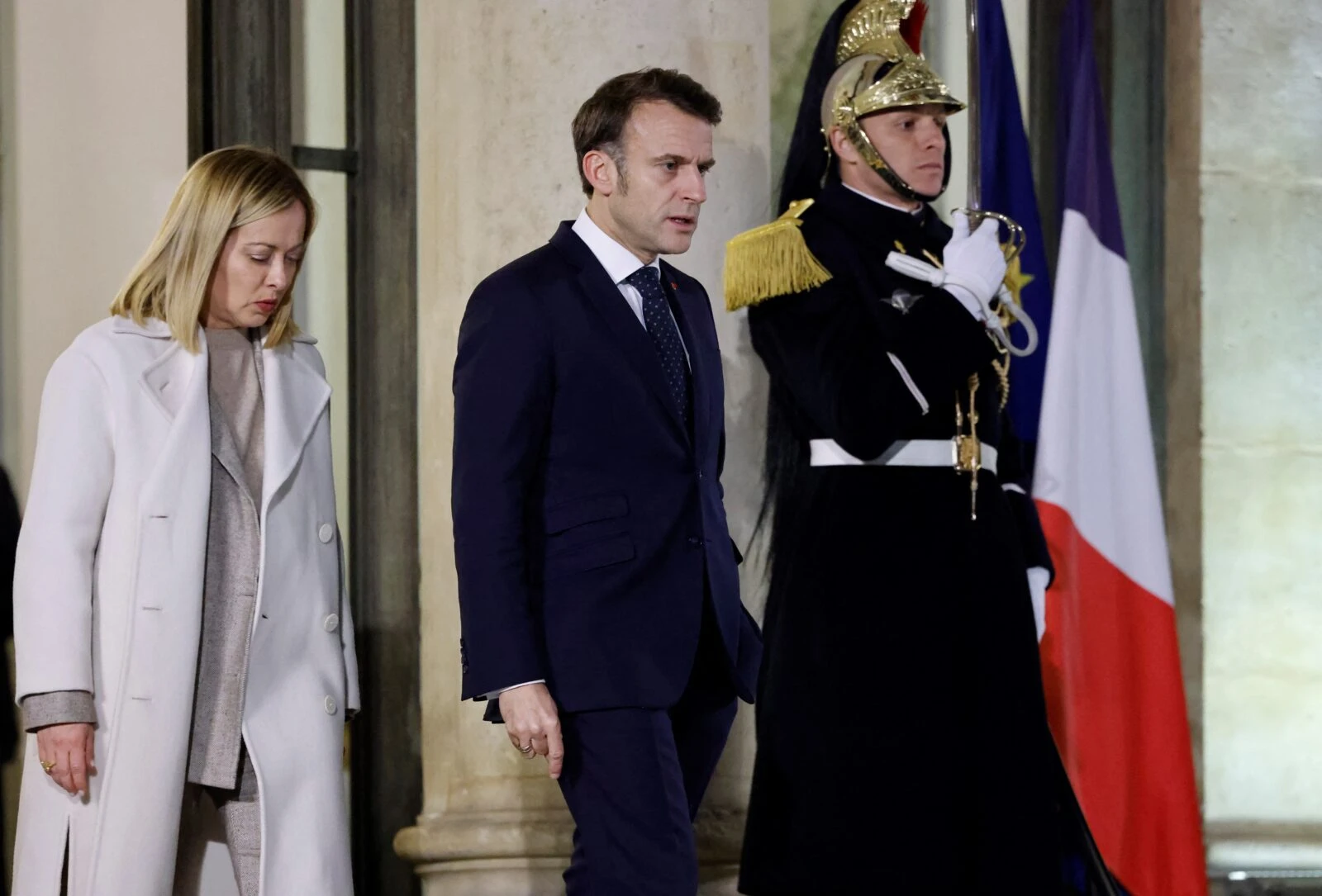Riyadh talks are about new order, not neglecting Ukraine
 Officials from both sides were set to explore avenues for ending the war in Ukraine and mending U.S.-Russia ties. The talks followed President Trump’s extended phone call with Russian President Vladimir Putin less than a week earlier. (Collage prepared by Türkiye Today team)
Officials from both sides were set to explore avenues for ending the war in Ukraine and mending U.S.-Russia ties. The talks followed President Trump’s extended phone call with Russian President Vladimir Putin less than a week earlier. (Collage prepared by Türkiye Today team)
For years, discussions of a multipolar world have fueled political analysis, with many arguing that global power is no longer concentrated in the hands of a single hegemon. Before Donald Trump’s presidency, policymakers and academics widely speculated that economic and political influence was becoming more evenly distributed. However, rather than witnessing a true shift toward multipolarity, globalization largely remained an extension of American dominance.
Trump’s administration shattered this illusion, rejecting the internationalist approach that had long defined U.S. leadership. By prioritizing national-ideological interests over collective agreements, Washington began to pull away from traditional alliances, reinforcing a model of unilateral dominance.
This shift left only one credible challenger to U.S. supremacy—China. As Beijing’s economic and military capabilities expanded, the global stage became increasingly defined by U.S.-China competition, leaving other nations, particularly Europe, in an uncertain position. Now the Trump administration acts accordingly.
The absence of Ukraine from high-stakes negotiations in Riyadh does not mean it is being sidelined; rather, it signifies that the conversation has moved beyond its borders, and now the U.S. and Russia have a bigger issue to talk about, like the new world order.

US-Russia ‘option’: A marriage of convenience
Amid rising tensions with China, the U.S. is looking for ways to weaken Beijing’s global reach. A crucial aspect of this strategy involves pulling Russia away from its growing economic and military partnership with China, known as the “DragonBear” alliance. If Washington can drive a wedge between Moscow and Beijing, it would allow the U.S. to focus its energy on containing China without facing a coordinated front from both powers. Sacrificing Ukraine is seemingly an option for the 47th.
Political historian Cagri Erhan predicted that Ukraine would not be taken before Trump sat down at the negotiating table with Russia, adding that if Putin and Trump meet, the discussion will likely go beyond Ukraine to include the broader restructuring of the relations—specifically, the possibility of Russia distancing itself from China and moving closer to the U.S.
Moscow has its own calculations that draw parallels. The Kremlin benefits from a divided Europe and a NATO that struggles to project unified strength. By maintaining instability in Ukraine and limiting Western influence in Central Asia and the Caucasus, Russia ensures its regional security while leveraging its role as a global disruptor. “A strong EU, closely aligned with the U.S., directly threatens Russia’s strategic position,” says Dmitry Grozoubinski, an international trade expert. “Moscow sees its relationship with China as necessary, even though it knows this carries risks in the long term.”
The implicit understanding between Washington and Moscow revolves around keeping Europe from becoming an independent global power center. Both the U.S. and Russia benefit from a fragmented EU, as it prevents Brussels from countering their respective pressures.
Samuel Doveri Vesterbye, Managing Director at the European Neighbourhood Council, underscores another dimension of this strategic maneuvering: digital and economic dominance. “Washington wants to secure digital access for its tech companies, but EU regulations, such as the General Data Protection Regulation (GDPR) and the Digital Services Act, pose significant restrictions.” He explains that Trump’s administration has worked to weaken these regulatory barriers by pressuring individual member states, circumventing European unity in favor of bilateral deals.
This fragmentation is precisely why Europe struggles to assert itself as a cohesive force. “In order for that process to really work well, you need a country that is willing to take some risks and also willing to sacrifice,” the seasoned director adds. However, not every EU member is ready to make those commitments.
This arrangement also affects middle powers like Türkiye, whose geopolitical influence is often seen as disruptive to both U.S. and Russian interests. By limiting Türkiye’s engagement in the Caucasus and Central Asia, both Washington and Moscow maintain control over the region. Meanwhile, Ukraine finds itself caught in the middle, a pawn in the larger game of great-power politics.
The Vance Doctrine
The deepening cracks in U.S.-EU relations became even more visible when U.S. Vice President J.D. Vance recently addressed European delegates. Instead of highlighting external threats like Russia or China, he focused on what he claimed to be Europe’s internal governance failures.
His remarks reflected the Trump administration’s transactional approach to foreign policy, where alliances are no longer based on shared democratic values but on immediate strategic interests.
Vance accused the EU of suppressing political opposition and free speech, citing Romania’s annulled elections, the prosecution of an anti-abortion protester in the U.K., and the exclusion of far-right and far-left figures from the Munich Security Conference.
“To many of us on the other side of the Atlantic, it looks like entrenched political elites using Soviet-era tactics to silence dissenting voices,” he stated. His sharp critique of EU governance framed the bloc as increasingly authoritarian, rather than a beacon of democracy.

A new form of hegemony
Historically, the U.S. relied on multilateralism to maintain its global influence. Through institutions such as NATO, the United Nations, and the World Trade Organization, Washington positioned itself as a leader within a rules-based order. However, with Trump, this approach has given way to a more unilateral and transactional style of diplomacy.
Greg Swenson, chair of Republican Overseas U.K., has framed this approach as “threats were to encourage behavior one would expect from allies, as well as more fair trade.”
Grozoubinski warns that this shift will have profound implications for trade. “If Trump follows through on his statements regarding the EU, we’re likely to see tariffs on European goods, and in response, the EU will impose countermeasures. While this won’t necessarily collapse global trade, it will increase costs, disrupt supply chains, and reduce economic efficiency.” The result is an era where global commerce becomes another battleground in great-power competition.
This transition is not just about geopolitics; it has significant implications for trade and economic stability. Grozoubinski explains, “We are certainly seeing major economies move away from the status quo, which favored stability and predictability. Trump’s approach rejects that model, favoring aggressive and unpredictable trade policies in pursuit of broader strategic goals. While this doesn’t guarantee a fragmented world, it certainly makes it more likely.”
Professor Erhan takes this a step further, describing Trump’s vision as a form of global feudalism. “In medieval times, an emperor sat at the top, with kings beneath him, followed by lords, and finally serfs. Each provided resources and loyalty in exchange for protection. Today, Trump is trying to establish a similar system on a global scale, where the U.S. remains the undisputed ruler, leveraging economic and technological power to ensure obedience.”

New rules of power: Consent or coercion?
In talks to Türkiye Today, Erhan emphasizes that the key concept in this evolving world order is “consent.” “Will European allies willingly align with Washington’s vision? Will countries accept their place in this emerging hierarchy, or will they resist? This is both a transactional process and a psychological one.” He points to recent U.S. dealings in the Middle East as an example. “Trump told Saudi Arabia it would invest $700 billion. Days later, he raised the figure to $1 trillion. Why did Riyadh comply? Because in return, the U.S. guaranteed the monarchy’s survival and its regional leadership.”
Similar dynamics are playing out globally. Whether through economic incentives, military agreements, or threats of tariffs and sanctions, Washington is reshaping its approach to alliances. “Look at Colombia,” Erhan continues. “The U.S. told them to accept deported migrants or face trade restrictions. They had no choice but to comply. This is a strategy of carrots and sticks, where loyalty is bought or enforced.”
Vance’s speech reinforced fears that the traditional concept of a united West is eroding. With Washington pivoting toward a more transactional foreign policy, Europe faces a crossroads. Some policymakers are advocating for greater strategic autonomy, seeking to reduce dependence on the U.S. But as Grozoubinski warns, “That’s easier said than done. Europe remains deeply integrated into the transatlantic security framework. Breaking away would carry enormous risks.”
The expert sees this moment as a turning point in global power structures. “The world order is no longer about international law—it’s about leverage. The old system of liberal norms is fading, replaced by a world where power, not rules, determines outcomes.”
Erhan describes hegemony as a contagious phenomenon, arguing that when those at the top engage in hegemonic actions, their collaborators will attempt to exert dominance over those beneath them. This, he suggests, will lead to a chaotic period where the powerful justify their actions as rightful, while the rightful lack power—ultimately upending the system built since World War I.
If the new world order unfolds as Trump envisions, Erhan asserts, the key principle will not be justice, international law, or global institutions, but sheer power. Moreover, he argues that this power will not be limited to traditional pillars like military, economic, smart, and soft power but will also incorporate a crucial new element: technological power.
He believes that technological dominance will be the new currency of global influence. “Controlling AI and quantum technology will be the key to controlling the world. This is no longer about oil or trade routes. It’s about who owns the future.”
The change is not in the system itself but in the American method. The U.S. is now taking a different approach to maintain the same influence, in an adaptation due to changing needs. Therefore, rather than a process where more power emerges, we are entering an era where power is concentrated in fewer hands, with America aiming to claim it all.



